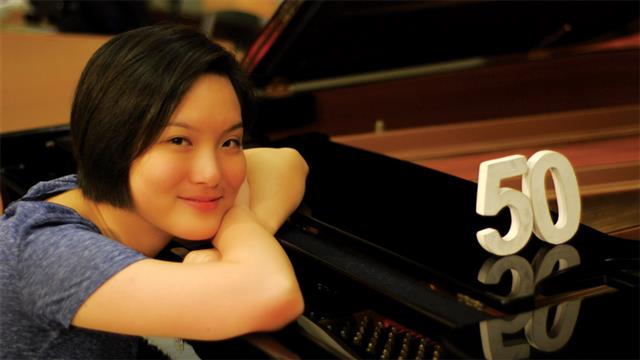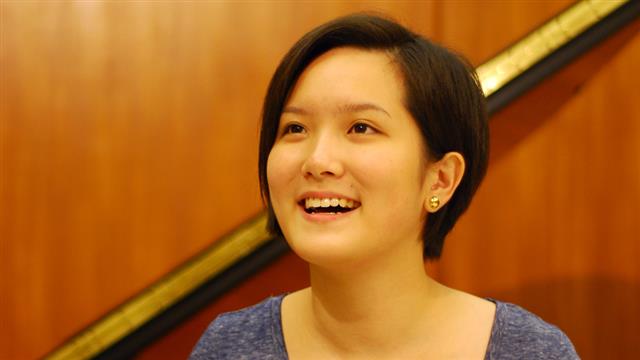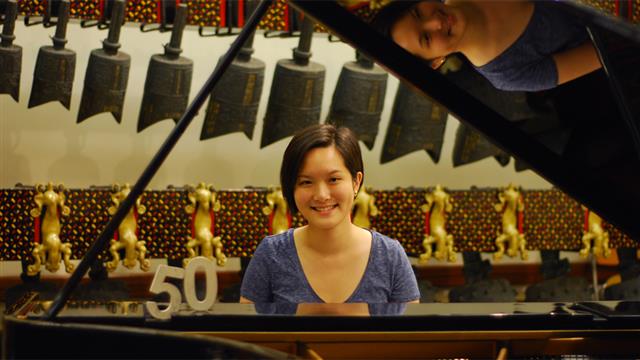How did you become interested in music?
When I was about three, I liked to play the electronic keyboard. I was able to reproduce on it melodies that I had heard only once. My parents let me take piano lessons and bought me a piano to replace the keyboard.
Other than the piano, you also learnt to play the violin, the guitar and drums. Were there others? Why did you learn different kinds of musical instruments?
I love music composition and arrangement. The violin is a string instrument, drums are percussion, and guitars are commonly used in pop music. I wanted to learn about the features and limitations of different instruments so as to use the most suitable ones in my music. I learnt erhu too while studying in CUHK.
Why do you like music composition and arrangement?
I felt a bit bored with constant piano practice. I looked for something to amuse myself. That's how I started composing and arranging music. In Secondary 4, I composed a song for my classmate to sing in a music competition. We won a prize and the appreciation of Mr. Ronald Ng who gave me a scholarship to study for a Diploma in Music Composition and Production at his music school. He also offered me a contract to participate in the production of cantopop. Several of my works were sold to pop singers.
You're classically trained but now involved in pop music. Are you interested in crossing genres? Who is your favourite crossover composer or performer?
I don't want to miss anything when it comes to music. In addition to playing the piano, I am also a member of a choir and I play orchestral music. I don't think there is any conflict between classical and pop music. There will be more diversity in the music circle if classical or serious music is more accessible to the general public, or if more people could appreciate different types of music.
Mr. Ng Cheuk-yin is one of the local musicians I admire. He is an alumnus of the Department of Music and my teacher. This full-time composer was the founder and music director of 'SIU2', a fusion band. His compositions have included orchestral, chamber, choral, Chinese instrumental, music for the theatre and dance, musical, and pop.
When did you decide that music would be your lifelong career?
I have known for a long time ago that music is something I would never want to live without. Having been involved in pop music production, I realized this interest could also be a career. But I'm not sure how I should develop it, so I have decided to study at the Department of Music to learn more about different aspects of music before making a decision.
What is your take on children learning the piano? Any suggestion for beginners?
I resent learning it just for the exams. Children will lose interest if they are made to practise a few examination pieces repeatedly. A more positive approach would be to kindle their interest in music. They will then learn by themselves and feel passion for music. My advice is to play music they like and try to reproduce the melody heard. Through trials and practice, they can train their ear and polish their skills.
How was your musical and other developments influenced by studying in CUHK?
I had some very good teachers in the department and I enjoyed my studies thoroughly. Prof. Victor A. Vicente impressed me the most. I took his courses on Bollywood film score, music and politics, etc., and participated in his studies on musical education in prisons. It is Professor Vicente who inspired my interest in ethnomusicology and led me to pursue further studies in this area. If I did not study at CUHK, I would not have taken the path of research.
What made you want to teach young inmates at the Pik Uk Correctional Institution?
Ms. Nancy Loo, my piano teacher, has been teaching music at Pik Uk for over 10 years. She knew that I was familiar with pop music, so she asked me if I was interested in taking up the job. I agreed at once. I went there about once a week for two or three hours. Though these young inmates were shy when we first met, they show great diligence in learning because they are grateful for someone who comes all the way to teach them. Their progress has been astonishing! Moreover, their self-confidence and communication skills have improved. Some felt lost about the future but have now identified targets. The experience has shown me the power of music. It's grounded and it helps people. My target is to use music to help the socially disadvantaged and as a vehicle for social advancement.
What do you expect to gain from Oxford where you will pursue Master's studies. Any plans upon graduation?
I went on exchange to Yale and Columbia where I met people with distinct opinions, who were passionate and had no regrets. I hope to meet outstanding people at Oxford so that I can learn from them. I'll continue with research after completing my studies. And, I would like to keep on composing pop songs, if possible.
What did you learn as a part-time assistant for Paul Zukofsky, a renowned violinist and composer?
I have gained an invaluable mentor and a very dear friend. He adopts a very scientific approach in his research, which has prompted me to look at my own work from different angles. Zukofsky has worked closely and known personally such musical greats as Iannis Xenakis, Philip Glass, John Cage and Milton Babbitt. I get to learn more from him about the genesis of the composers' works, their philosophies, and even some of their antics. We would also discuss art, politics, literature, architecture, and many other things. My horizons had been broadened immensely.
What are your hobbies except music?
Playing badminton, watching movies and reading.





